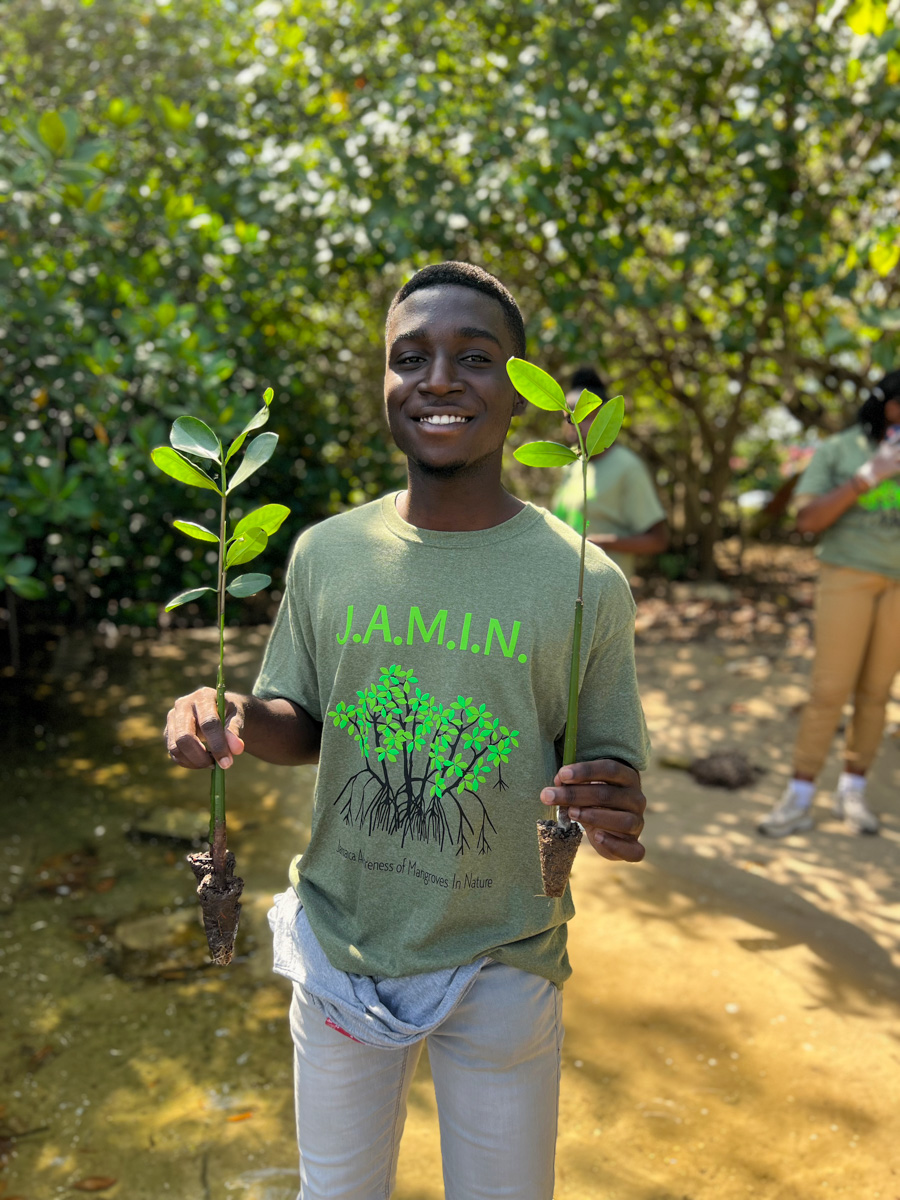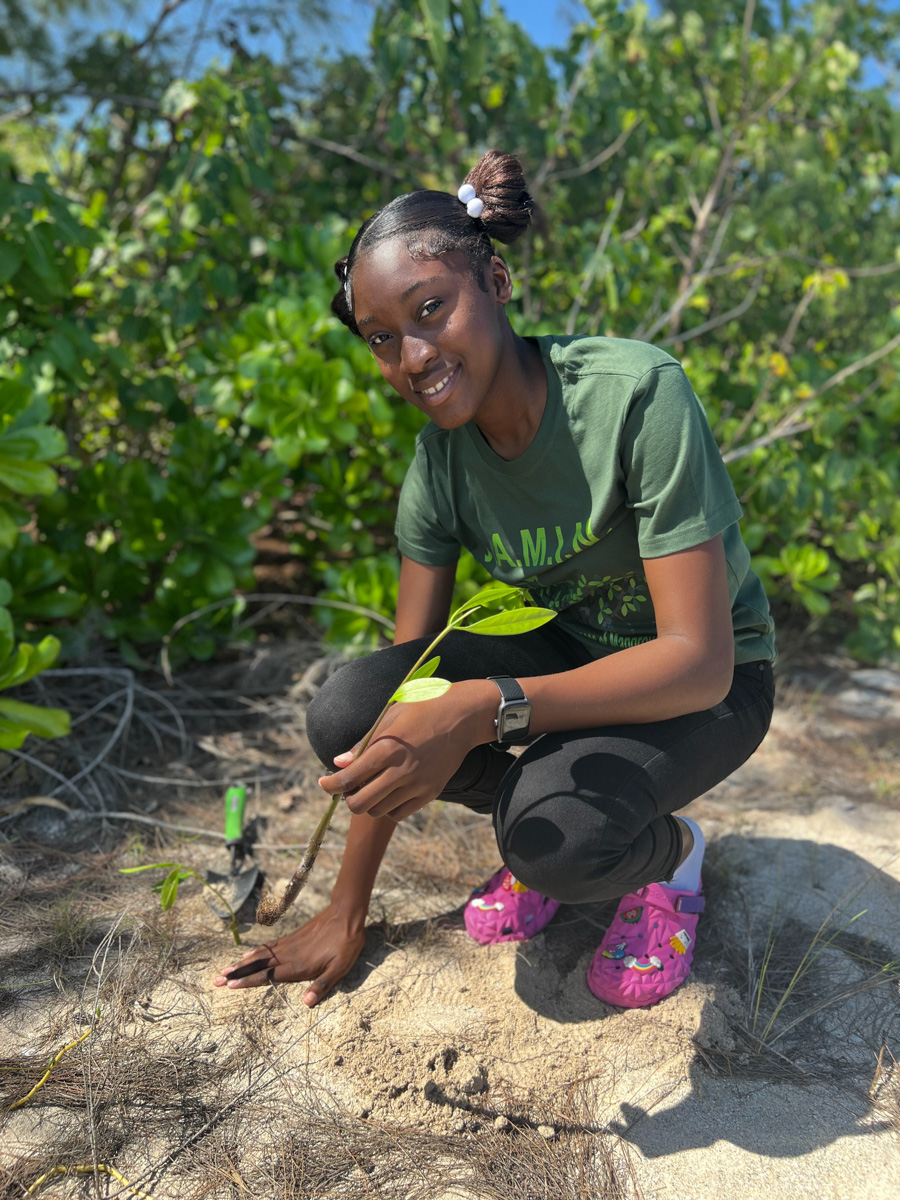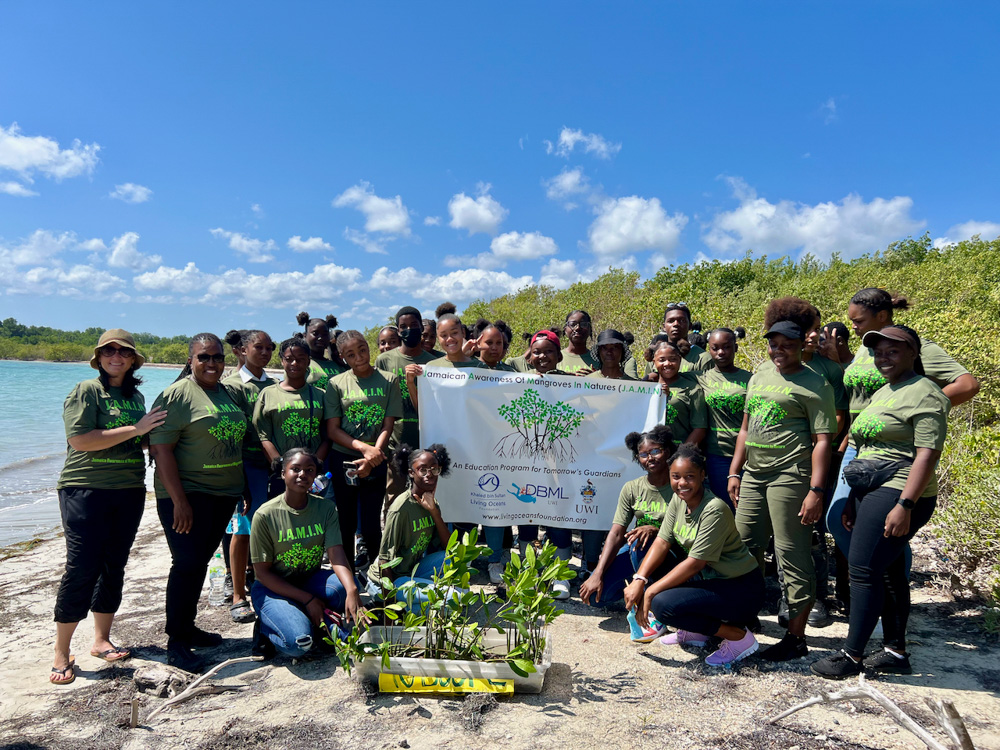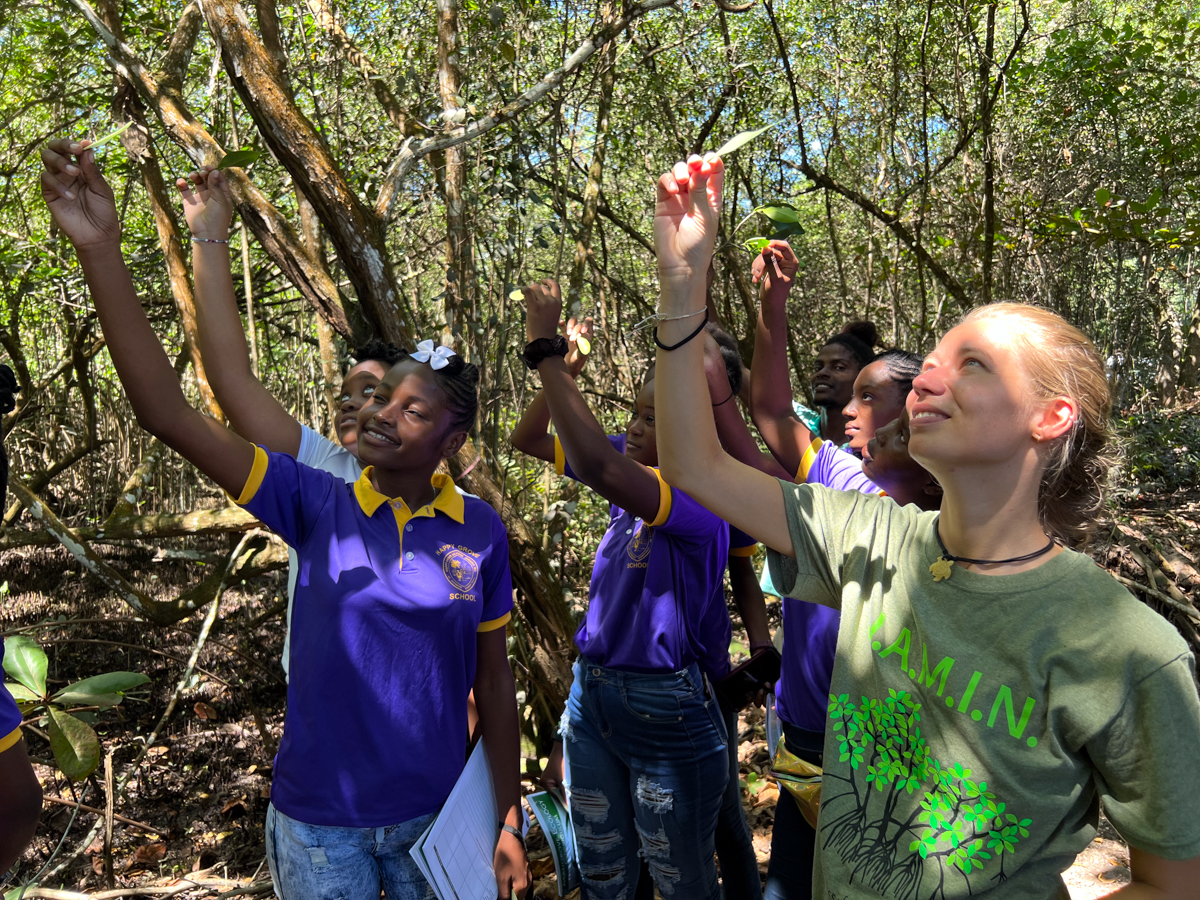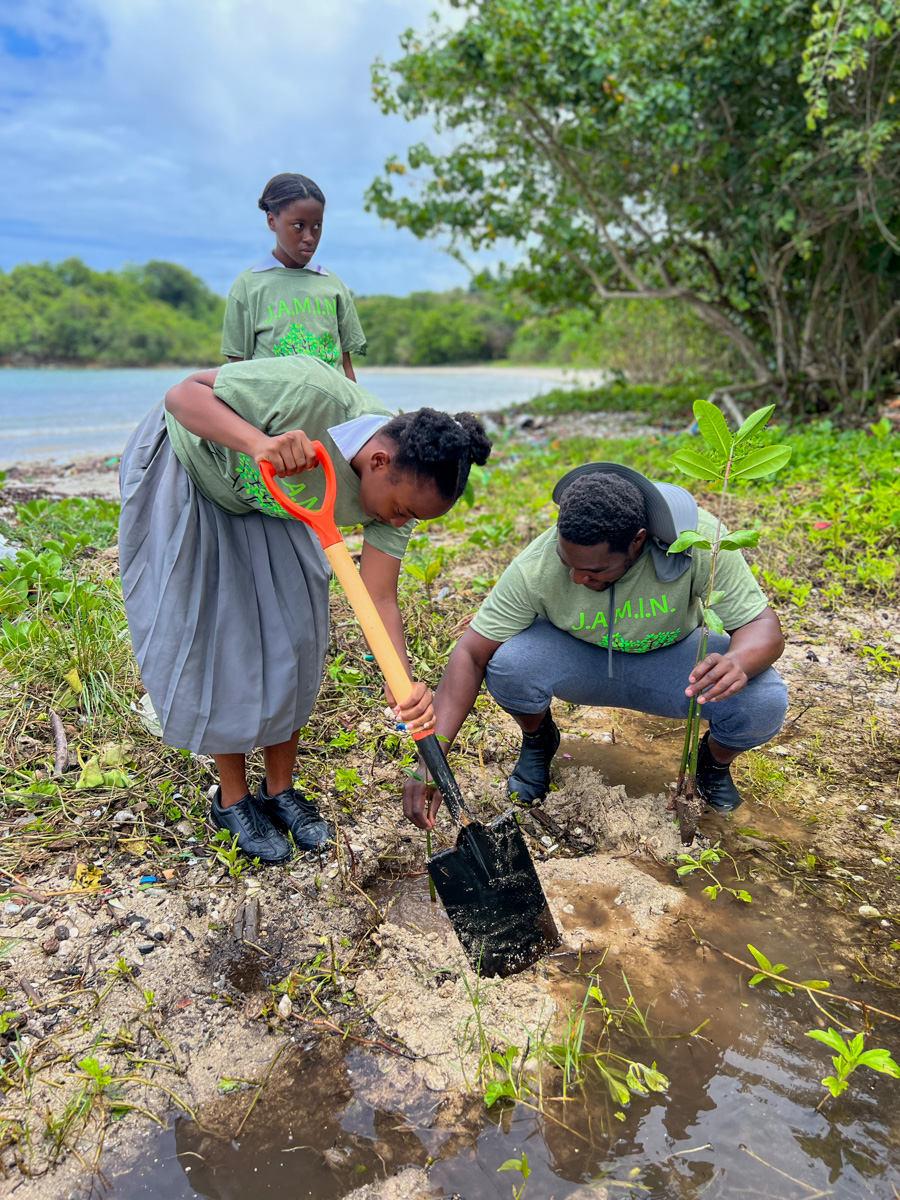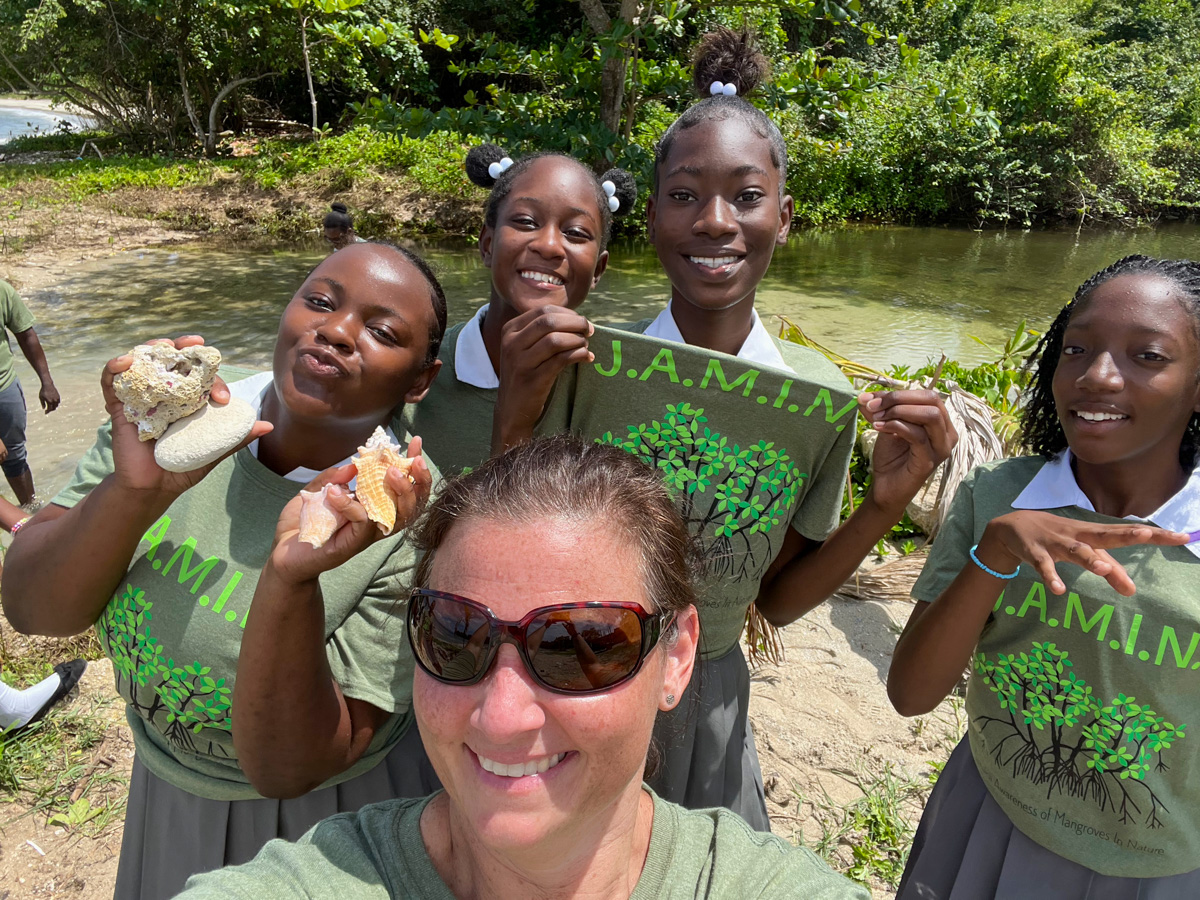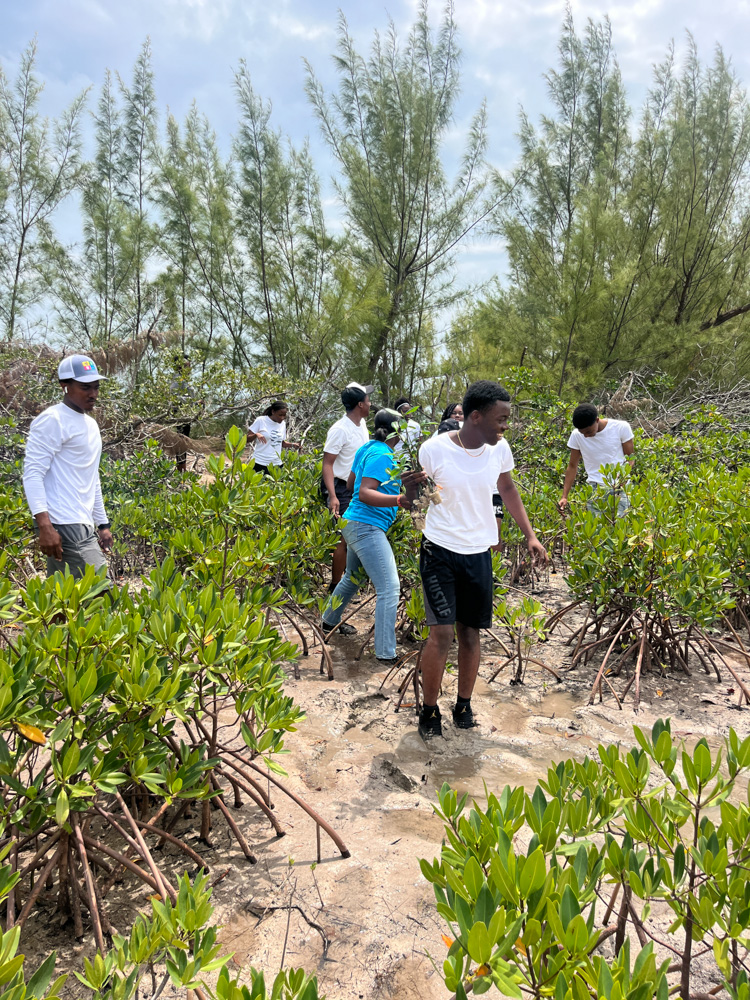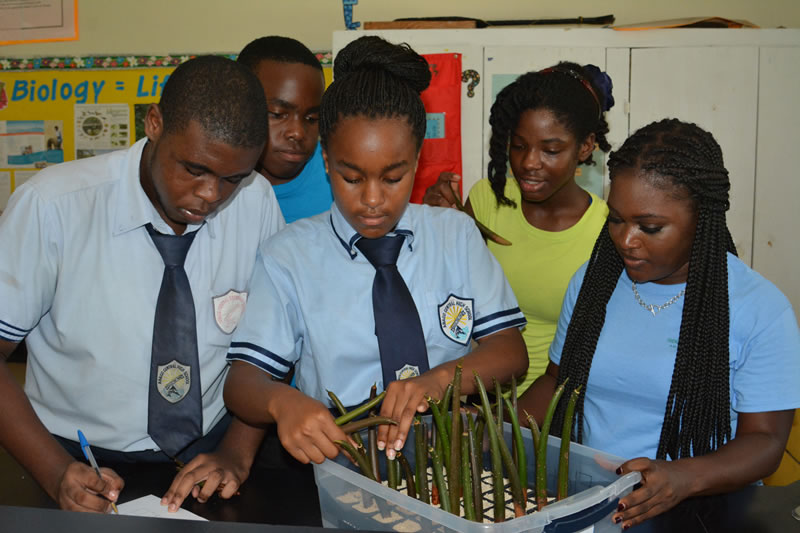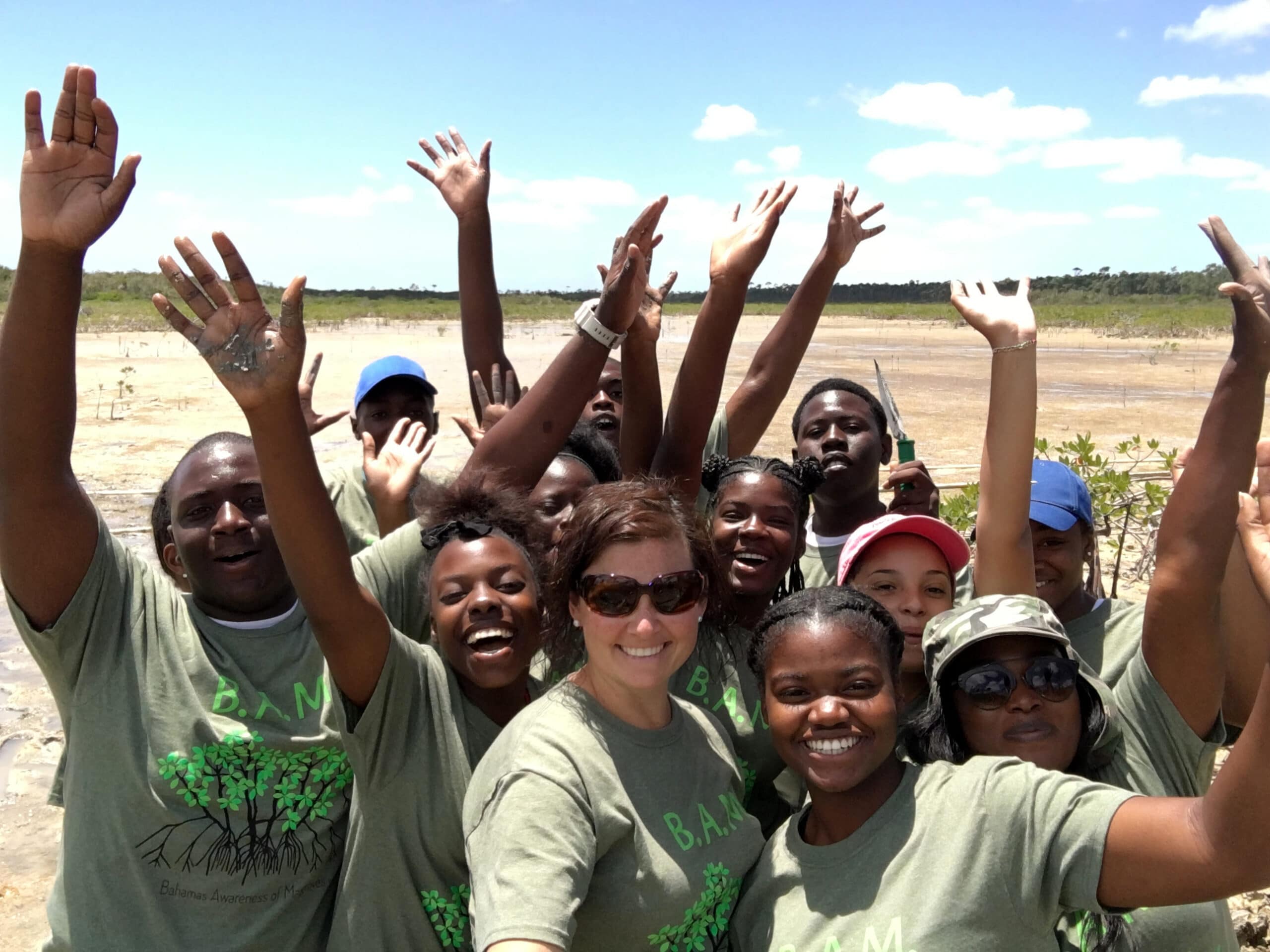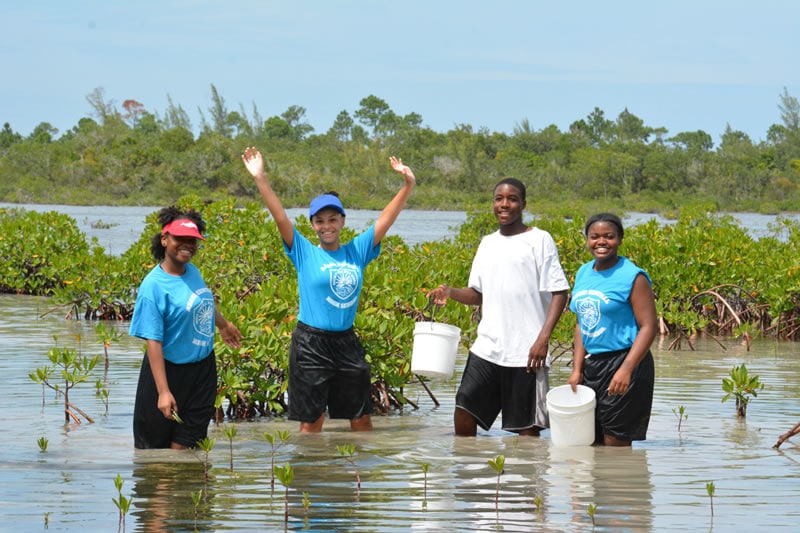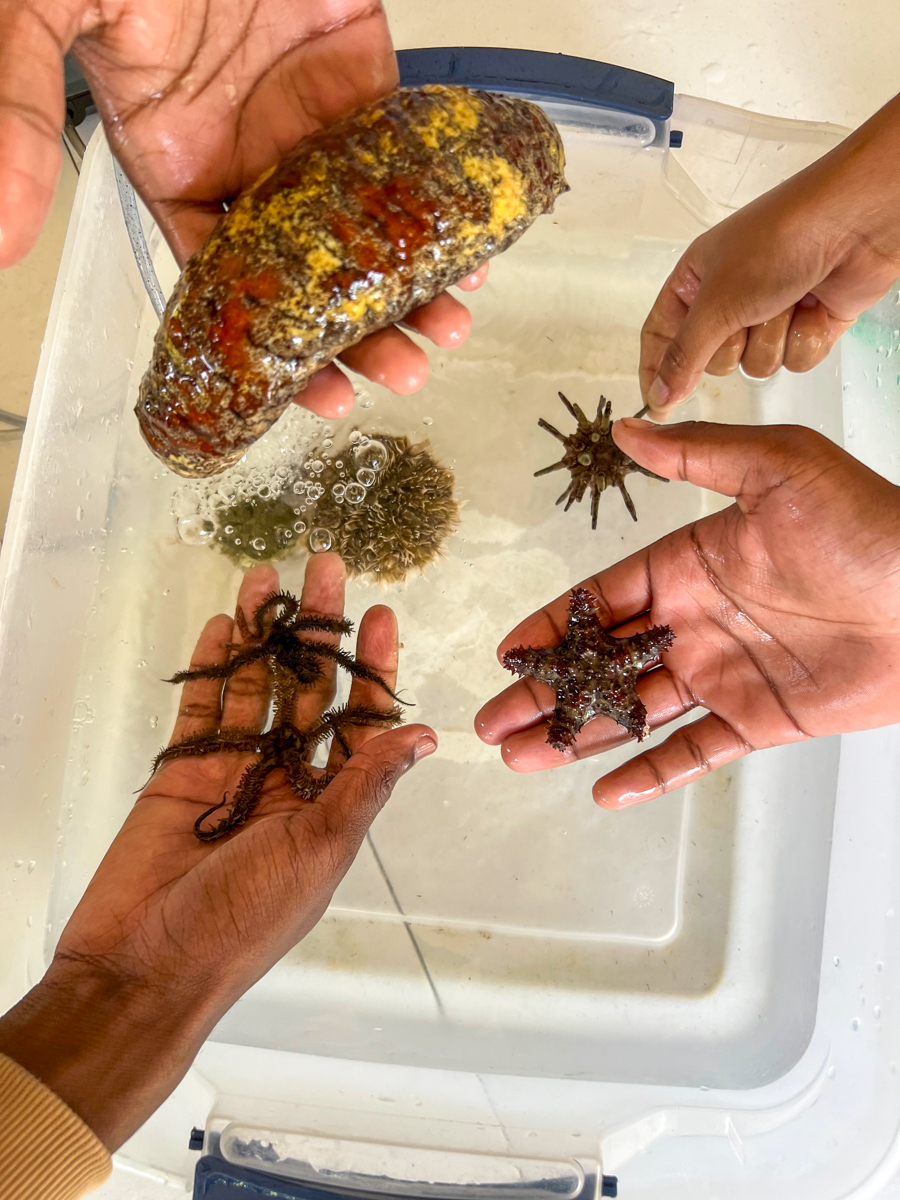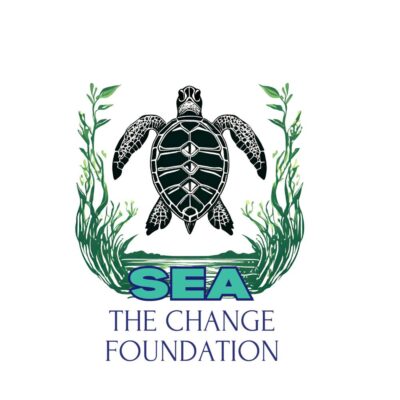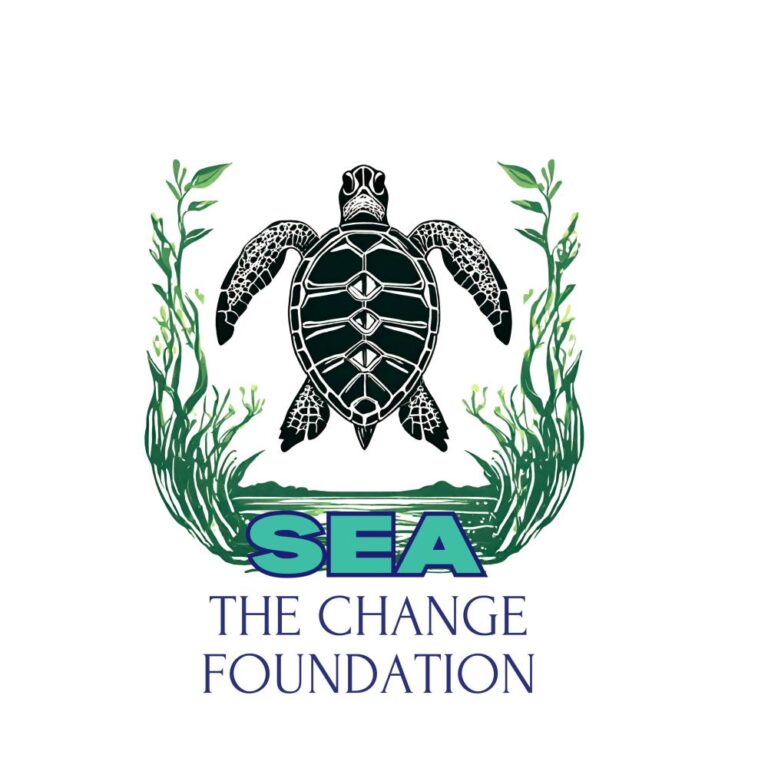Mangrove Education & Restoration
Inspiring the Next Generation of Mangrove Stewards
Mangrove Education & Restoration
Inspiring the Next Generation of Mangrove Stewards
About the Project
Restoring Mangroves, Empowering Communities
The Khaled bin Sultan Living Oceans Foundation’s Mangrove Education & Restoration program is a hands-on initiative designed to educate students about the importance of mangroves while actively restoring these critical marine ecosystems. Through immersive learning experiences, students gain firsthand knowledge of mangrove biology and ecology, a deeper understanding of the benefits mangrove forests provide to people and the environment, and how they can contribute to local mangrove conservation efforts.
Mangroves are among the world’s most important and threatened ecosystems. They provide coastal protection, support biodiversity, store carbon, and offer vital ecosystem services to local communities. Yet over one-third of the world’s mangroves have been lost in the past 50 years due to coastal development, pollution, and climate change. By engaging students, teachers, and community members in conservation, our program fosters environmental stewardship and empowers the next generation to protect these vital coastal forests.
PROJECT LOCATIONS
Jamaican Awareness of Mangroves in Nature (J.A.M.I.N.)

The Jamaican Awareness of Mangroves in Nature (J.A.M.I.N.) program began in 2014, offering students across Jamaica a unique opportunity to study and restore mangrove ecosystems through experiential, year-long learning. Partnering with the Alligator Head Foundation, the Discovery Bay Marine Lab, and with support from Playa Hotels & Resorts, J.A.M.I.N. engages students in ecological experiments, field trips, and restoration activities. Students learn to identify mangrove species, monitor their growth, explore mangrove food webs, and participate in real-world conservation projects by planting seedlings in vulnerable areas. Now active in multiple locations across the island, the program has empowered Jamaican youth to become environmental stewards and continues to expand, building awareness of the critical role mangroves play in coastal resilience.

Bahamas Awareness of Mangroves (B.A.M.)

Launched in 2015, the Bahamas Awareness of Mangroves (B.A.M.) program introduces Bahamian high school students to the importance of mangrove ecosystems and engages them in hands-on restoration projects. In partnership with FRIENDS of the Environment, students participate in immersive field trips and classroom lessons where they learn how mangroves protect coastlines, provide habitat for marine life, and support local communities. Participants grow and plant mangrove seedlings in areas where forests have been degraded, directly contributing to the restoration of these vital ecosystems. Over the years, the program has reached hundreds of students across the island of Abaco, inspiring youth to become environmental stewards in their own communities. Several B.A.M. lesson plans have since been incorporated into FRIENDS’ Ecosystems of The Bahamas teacher’s guide, which is now used in high schools nationwide, expanding the program’s educational impact nationwide.

Expanding Our Reach
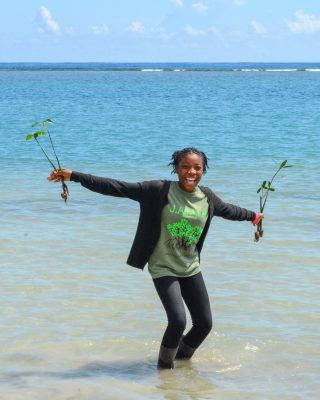
While our Mangrove Education and Restoration Programs are currently active in The Bahamas and Jamaica, our vision extends far beyond these shores. By providing students with hands-on environmental education and the chance to directly participate in restoration projects, this program has proven to be a powerful tool for building local stewardship and protecting coastal ecosystems. We are eager to partner with schools, organizations, and communities worldwide to bring this impactful initiative to new regions. If you are interested in launching a program in your area, contact us to explore how we can collaborate to protect mangroves for future generations.

Our Impact
PROJECT PHASES
Phase 1: Explore & Collect
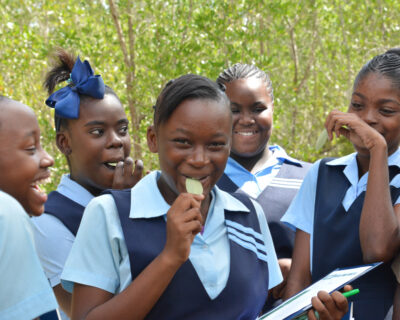
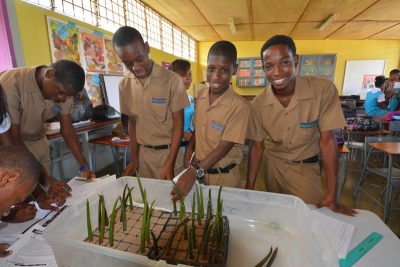
Immerse students in the mangrove forest and begin their restoration journey
The school year begins with an adventure into the mangrove forest. Students explore this vital ecosystem firsthand, learning to identify different species of mangroves and discovering how these coastal forests protect communities and marine life. During this visit, students collect propagules—young mangrove seedlings—that they will bring back to the classroom to study and grow.
Back in school, students launch a hands-on science experiment by planting the propagules in three different soil types—sand, pebbles, and mangrove mud—and record weekly measurements to track their growth. This phase introduces them to real-world scientific research and sparks a sense of stewardship for their local environment.


Phase 2: Discover the Mangrove Food Web
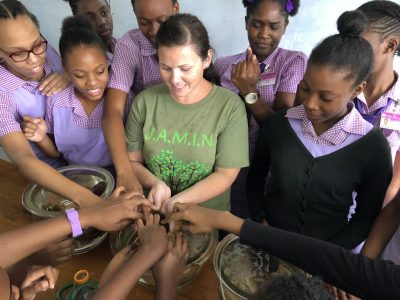
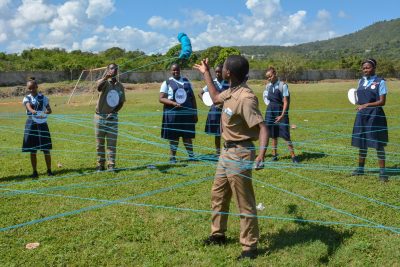
Connect classroom learning to the living ecosystem
Midway through the year, students dive deeper into the intricate food web that thrives within mangrove forests. Interactive lessons bring the ecosystem to life as students observe and interact with creatures like crabs, snails, and small fish that call the mangroves home. These hands-on experiences allow students to see how energy moves through the ecosystem and reveal the unique role each species plays in the mangroves.
Through classroom experiments and interactive activities—like modeling a food web—students gain a deeper understanding of the interdependence of life in the mangroves. This phase reinforces the importance of biodiversity and builds a strong foundation for environmental stewardship.


Phase 3: Restore & Reflect
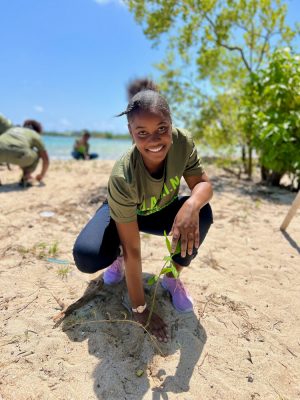
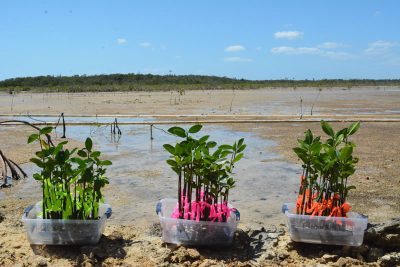
Return to the forest to restore the ecosystem
The school year concludes with students returning to the mangrove forest, where they plant the seedlings they have nurtured all year. By graphing their growth data, they determine under which soil conditions mangroves grew best, turning months of observation into meaningful insights.
Planting the propagules is more than just a hands-on activity—it is an act of restoration. Students see the tangible results of their hard work and leave a lasting impact on their community’s ecosystem. This final phase strengthens their connection to nature, fosters environmental stewardship, and shows students that their actions can truly make a difference.


Year 2: Monitor & Manage Mangroves
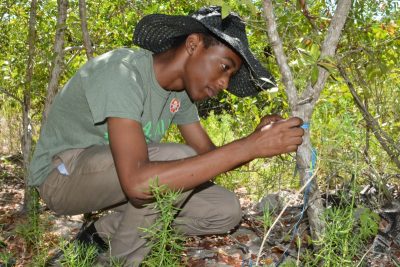
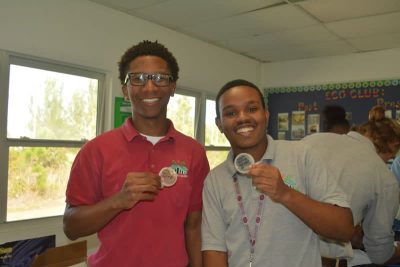
Apply lab and field skills and contribute to real-world mangrove science
Students who continue on to the second year of our Mangrove Education & Restoration Programs become active stewards of their local mangrove forests. They revisit the sites they helped restore to monitor ecosystem health, collect water quality data, and track the growth of mangrove trees using techniques employed by scientists.
As Mangrove Detectives, students investigate signs of pests and disease, collect samples for further analysis, and share findings with mangrove researcher Dr. Ryann Rossi for genetic testing. They also participate in the EarthEcho Water Challenge, contributing their water quality data to a global citizen science database. By engaging in this hands-on monitoring and management and participating in these citizen-science projects, students deepen their scientific skills and develop a lasting sense of responsibility for the ecosystems they help to protect.


STUDENT VOICES
“My favorite part of the project was participating in an experiment to see how mangroves grow in different types of soil.”
– Abigail Haddo, William Knibb Memorial High School
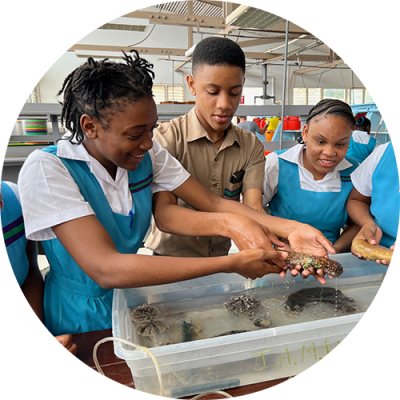
“I have learned so much about mangroves and the environment from the lovely mentors of J.A.M.I.N. I am inspired to plant and protect the mangroves so that Jamaica’s natural state is preserved for generations to come.”
– Sidainna Frater, William Knibb Memorial High School
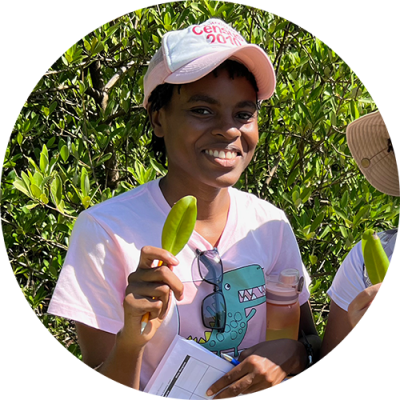
“I have learned that there are limited mangroves in Jamaica and that getting rid of mangroves can pose a real threat to future generations. I have also found from this very interesting journey, that I have developed a love for mangroves.”
– Kennejah Hayden, Port Antonio High School
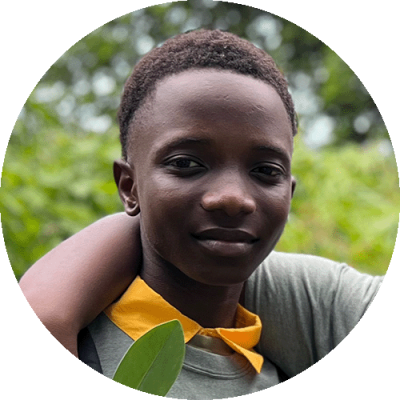
“Thanks for making this experience of learning about mangroves easy and fun. I especially liked when we visited the marine lab in Discovery Bay, where I got a real life viewing of various animals that I only heard about or saw on TV.”
– Thronifer Morrison, William Knibb Memorial High School
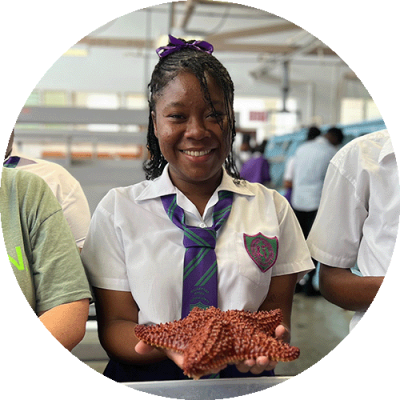
“At first, I didn’t know anything about mangroves, but as soon as J.A.M.I.N. started, I learned a lot about the mangroves and how beneficial this ecosystem is to our everyday lives.”
– Sabrina Bailey, Happy Grove High School
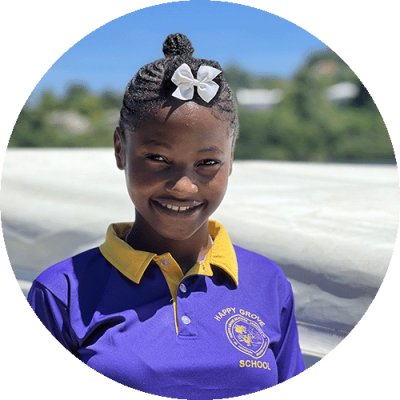
“B.A.M. has been one of my high school highlights. I’ve had so much fun learning about the mangroves and now I get the chance to educate others on the beauty of the mangroves. We had the best teachers to teach us. Thanks to Ms. Amy, Ms. Lianna, and Ms. Lyndeisha for teaching us….B.A.M. for life! Once a BAMER, Always a BAMER!!!”
– Jerai Bremen, Forest Heights Academy
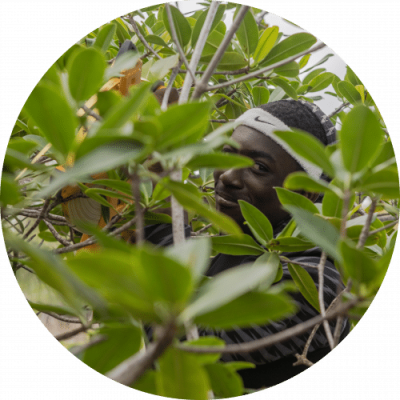
“I learned how big of a part mangroves play in Bahamian ecosystems and that we should do more to protect them because they protect us.”
– MacKenzie Ferguson, Forest Heights Academy
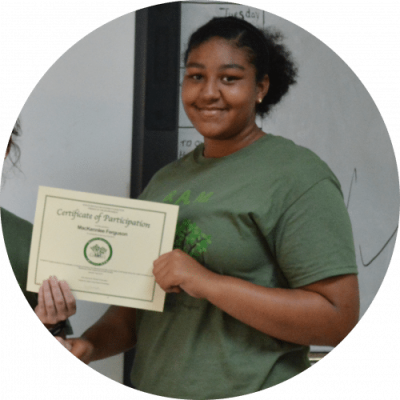
“I learned that mangroves are more vital to the conservation of the earth than I ever could have imagined.”
– Benjamin Cornish, Patrick J Bethel High School

Educational Resources
Resources for Marine Science Educators
Education is at the heart of our mangrove restoration work. By combining hands-on field experiences with classroom learning and citizen science, we empower students to understand, protect, and restore these vital coastal ecosystems. Our educational resources and programs give teachers the tools to engage their students in meaningful, real-world science while fostering a lifelong commitment to conservation.
Explore some of the ways teachers can bring mangrove education into their classrooms:
- Empower Your Students to Become Mangrove Detectives
Take your classroom outdoors and become citizen scientists! Mangrove Detectives is a hands-on program where students investigate the health of local mangrove forests by identifying diseased leaves, observing insect communities, and submitting their findings to help scientists track ecosystem health. By combining real-world fieldwork, classroom lab activities, and online reporting tools, Mangrove Detectives builds scientific skills, sparks curiosity, and allows students to contribute to ongoing research and conservation efforts. - Explore the Ecosystems of The Bahamas Educator’s Guide
Teachers can access several of our mangrove lesson plans through Ecosystems of The Bahamas, a comprehensive educator’s guide created by FRIENDS of the Environment. This free resource highlights Bahamian ecosystems, key species, and conservation practices to help bring local ecology into the classroom. - Stay Tuned for Our Upcoming Online Mangrove Curriculum
We are developing an online Mangrove Ecology Course as part of our new Living Oceans Academy, making our mangrove lesson plans and activities accessible to educators and students worldwide. Sign up for our newsletter to be the first to know when these new resources launch!
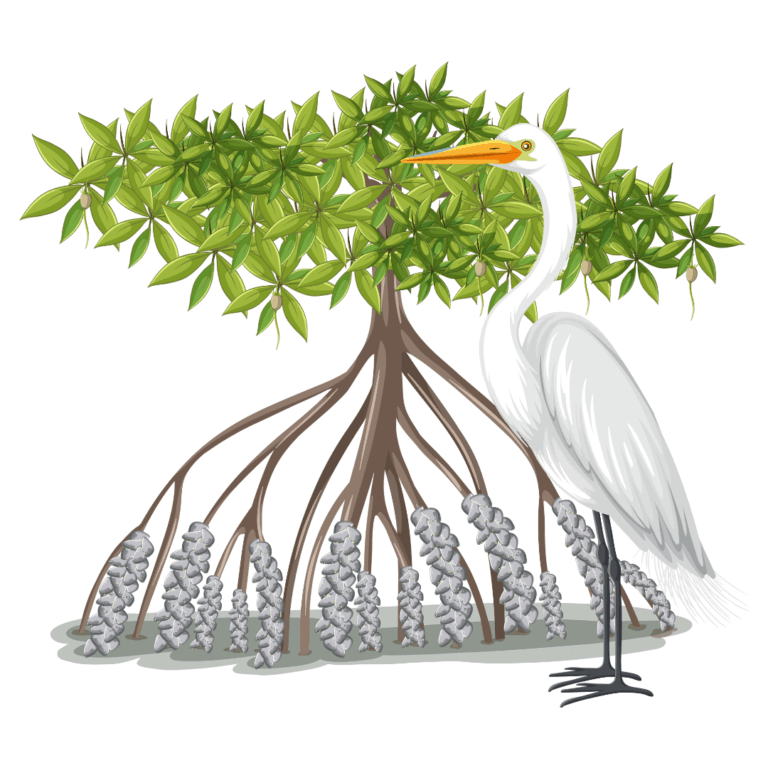
Partners
Friends of the Environment
FRIENDS of the Environment helps the Khaled bin Sultan Living Oceans Foundation deliver our Bahamas Awareness of Mangroves (B.A.M.) program to high school students on Abaco Island. Since 2015, this collaboration has brought hands-on mangrove education and restoration activities into Bahamian classrooms, helping students understand the vital role mangroves play in coastal ecosystems and local communities. FRIENDS provides critical on-the-ground support, including teacher training, field trips, and outreach to local schools. Together, we are equipping the next generation of Bahamians with the knowledge and tools to protect their natural heritage.
Alligator Head Foundation
The Alligator Head Foundation helped expand our mangrove education and restoration program in Jamaica—the Jamaica Awareness of Mangroves in Nature (J.A.M.I.N.) program—by bringing it to students in Portland Parish. Since 2018, this partnership has helped us engage more schools, teachers, and students in hands-on mangrove science and conservation. With a shared commitment to educating the next generation and protecting Jamaica’s coastal ecosystems, Alligator Head Foundation is a valued partner in our efforts to inspire students and community members to conserve and restore their mangrove forests.
Discovery Bay Marine Laboratory
The Khaled bin Sultan Living Oceans Foundation partnered with the University of the West Indies Discovery Bay Marine Laboratory to launch the Jamaica Awareness of Mangroves in Nature (J.A.M.I.N.) program in 2014. We continue to work together to implement this hands-on, project-based education program to teach high school students about the importance of mangrove ecosystems. The program began with two schools near Falmouth and expanded to include a second-year component focused on monitoring and stewardship. Over a decade later, Discovery Bay Marine Lab remains a key partner in delivering meaningful outdoor learning experiences that inspire mangrove conservation across Jamaica.
Sea The Change Foundation
The Khaled bin Sultan Living Oceans Foundation partnered with the Sea The Change Foundation in 2024 to bring the Jamaica Awareness of Mangroves in Nature (J.A.M.I.N.) program to Jobson Bay Eco-Beach Park in Falmouth, Jamaica. This 385-acre coastal sanctuary, with its white sand beaches, vibrant seagrass beds, and thriving mangrove forests, provides an unparalleled outdoor classroom for students from local high schools. Through this partnership, students plant mangrove seedlings, explore local biodiversity, and connect deeply with nature while contributing to meaningful restoration efforts. Together, we support Sea The Change Foundation’s mission to transform Jobson Bay into a hub for education, conservation, and sustainable community development.
Playa Hotels & Resorts
In 2024, Playa Hotels & Resorts joined the Khaled bin Sultan Living Oceans Foundation as a key partner and sponsor in the Jamaica Awareness of Mangroves in Nature (J.A.M.I.N.) program. Their sponsorship allows Jamaican students to immerse themselves in hands-on environmental education, exploring the critical role mangrove ecosystems play in coastal protection and community resilience. Playa Hotels & Resorts’ commitment to sustainability and local engagement helps ensure that students not only learn about the environment but also develop a lifelong sense of stewardship for their island’s natural resources.
Latest Updates
Support Our Work
Mangrove Education & Restoration Program

Our mangrove education and restoration program aims to increase environmental awareness and restore mangrove forests in the Caribbean.
We have partnered with local educational institutions to teach students and teachers about the ecological importance of their mangrove forests and help them get involved in mangrove restoration efforts.
Your support can help us educate more students and plant more mangroves, making a lasting impact on coastal conservation. Donate today to help expand this program and restore vital marine ecosystems.


